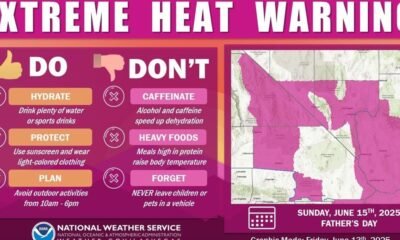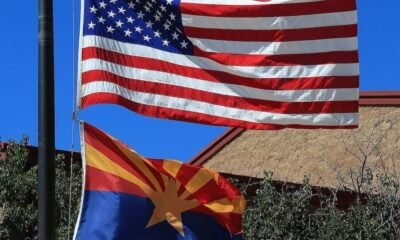construction
Hobbs Launches Task Force to Enhance Heat Safety for Workers

Arizona is taking significant steps to enhance workplace safety in extreme heat conditions. Governor Katie Hobbs has issued an executive order to establish a task force tasked with proposing updated safety standards by year-end.
While companies are required to protect their employees from heat-related illnesses, current guidelines remain vague. Employers must provide a safe work environment, but they lack specific directives that outline necessary measures such as shade, water access, and regular breaks.
Dennis Kavanaugh, chair of the Industrial Commission of Arizona, pointed out that the general duty clause complicates enforcement. “Defining what constitutes a safe working environment can be challenging,” he noted, drawing from his experience in the agency’s legal department.
More precise regulations could clarify expectations for employers, helping them avoid potential penalties. “Employers appreciate knowing exactly what is required in specific conditions,” Kavanaugh added.
Some cities have already enacted their own heat safety standards. Tucson, for instance, requires contractors to maintain detailed heat safety plans, ensuring access to water, shade, and necessary breaks. Phoenix follows suit with similar rules, while Tempe is poised to finalize a safety plan mandating breaks and access to cool areas for outdoor workers.
Currently, state-level guidelines lack the specificity needed for effective enforcement. Arizona law mandates a workplace devoid of known dangers, but it fails to outline clear actions that employers must undertake in extreme heat conditions.
Gaetano Testini, the Commission Director, indicated that data collection has been a priority and formalized with the new task force’s formation. This task force includes health and safety specialists as well as industry and labor representatives, with a report due by year’s end.
However, it is uncertain what specific recommendations will emerge. Testini refrained from addressing whether the recommendations would include numeric standards that define protective measures when temperatures soar.
The executive order leaves room for flexibility, as Hobbs has designated the task force’s output as “guidelines” rather than strict regulations. Kavanaugh noted that the commission might ultimately favor recommendations that provide employers with practical guidance instead of formal rules.
The governor’s order also emphasizes a recognition program for businesses that exceed basic safety requirements. Despite the absence of stringent regulations, Kavanaugh reported that Arizona employers are generally effective in safeguarding their workers. “There have not been many heat-related injuries or fatalities in recent years,” he stated, highlighting the proactive measures taken by construction companies.


















